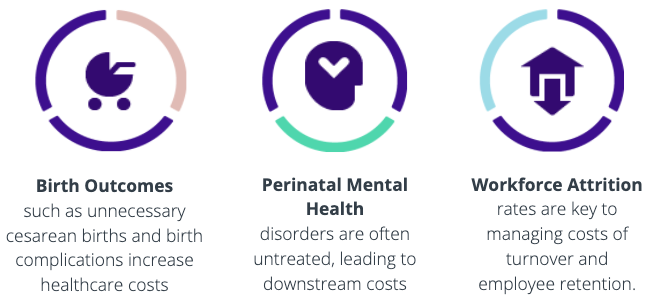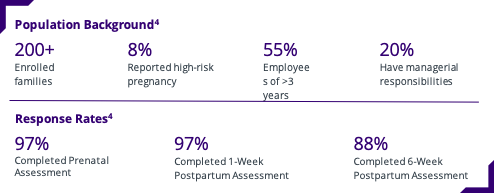
The case for perinatal care management
Working parents present an increasingly urgent demand for employers today. That’s because dual-income parents are the fastest-growing part of your population. More than ever, they are struggling to balance the contradicting pressures between home and work.
This population also represents one of the largest areas of healthcare spend. With $1 out every $5 spent on healthcare going towards services for birthing parents and children, nearly $24 billion is billed to private insurers annually for pregnancy & delivery and maternity & pediatric care. Cesarean births are the most frequent surgery performed in the U.S, and childbirth is the most common reason for hospitalization, representing nearly 25% of hospitalizations in the U.S. Cleo is designed to help you manage 3 key drivers of employer-related costs for growing families:

Birth outcomes
In the last 30 years, the rate of cesarean births has increased 3 fold in the U.S. alone. This is alarming, as we know that cesarean births are more expensive than vaginal births — in fact, up to 1.5x more. Over the last decade, U.S. employer spending on maternity care increased by 50%. Not only are cesarean births themselves costly, surgeries can also lead to future complications for both mother and baby. Maternal hospital stays for women with complicating conditions can cost up to 3x more than those for women without complications.
Perinatal Mental Health
A recent wave of research made the connection between the mental health of the parent and the health outcomes of both parent and child. While depression during pregnancy is associated with an increased risk of poor maternal self-care and obstetric complications, among other health issues, it is also linked to the health and development of the child.
Perinatal Mood and Anxiety Disorders (PMADS) affect 20-25% of birth parents. When left unattended to, PMADS can be costly. In a recent study, it’s estimated that the total societal cost of PMADs for all U.S. births in 2017 was $14.2 billion. While there is evidence demonstrating the prevalence of PMADS in birth parents, the mental health of non-birth parents is an emerging field of study, but equally important.
Workforce Attrition
While parents are the fastest-growing segment of the workforce, 43% of highly qualified women drop out of the workforce after starting a family. Mental health-related issues such as stress and anxiety and PMADS can attribute to attrition and absenteeism. When faced with high employee turnover and decline in productivity, employers find themselves paying costs of up to 213% of an employee’s salary to recruit, hire, and train a replacement. Nationally, employers are losing out on $225.5 billion a year due to lost productivity related to mental wellness alone.
Cleo aims to help families find the support and balance they need. Through reducing stress and anxiety, limiting mental health-related issues, and helping parents better manage their roles at home and at work, Cleo can help you reduce costs related to poor employee health, attrition, and lost productivity.
Intervention design

With its integrated family benefits platform, Cleo combines proactive, expert guidance with an intuitive telehealth platform that connects your people to the resources they need. As part of the standard Cleo program, we partnered with the health plan of a large biotech firm to measure our impact on these 3 key drivers of employer-related costs. Cleo conducted assessments at three stages in enrolled families’ journeys: prenatal, 1-week postpartum and 6-weeks postpartum.
Results
Over 200 employees at this employer partner were eligible to enroll in Cleo Baby, with 37% of enrolled employees identifying as first-time parents. With consistently strong engagement throughout the course of this 3-part survey and a large sample size, we are confident that this study captures valuable insights from our employer partner on the 3 key drivers of employer costs for growing families. Cleo members who were low risk, first-time parents had cesarean birth rates that were more than 3 times lower than the U.S. national rate. Furthermore, our study shows that 7 out of 10 Cleo parents exhibited high levels of parental confidence and 93% of Cleo members who are on parental leave plan to return to work on time. For full results of the study, click the PDF link below.
Click here for more data and view the entire Case Study (PDF)
